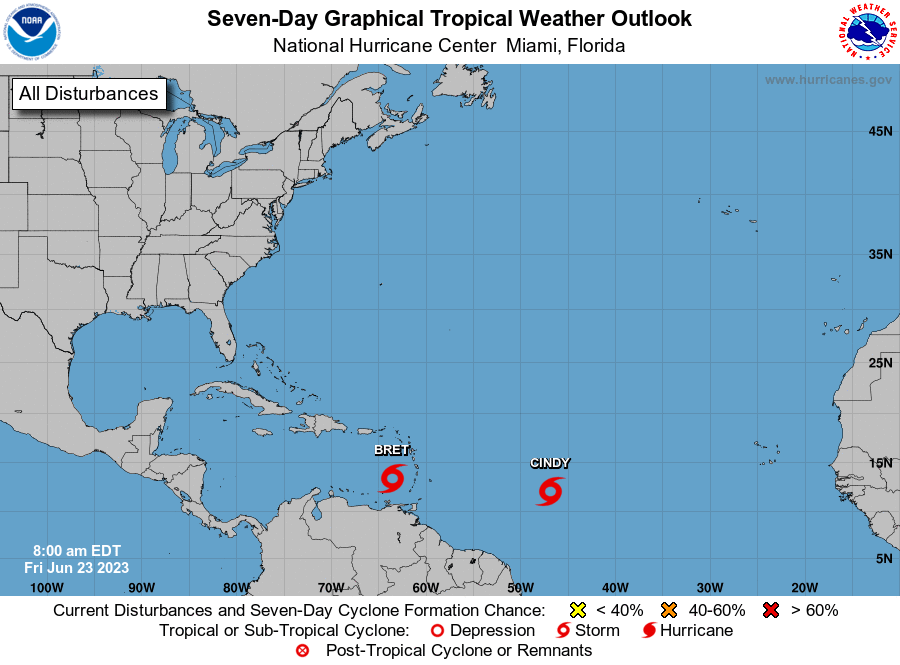CLICK HERE TO JOIN OUR WHATSAPP GROUP FOR NEWS UPDATES.
A day after becoming the second active tropical storm to threaten the Caribbean, Cindy was gradually strengthening on Friday, although it remained well out to sea and posed no immediate threat to land. CLICK HERE TO JOIN OUR WHATSAPP GROUP FOR NEWS UPDATES.
Cindy, the third named storm of this year’s Atlantic hurricane season, was nearly 1,000 miles east of the Lesser Antilles as of early Friday, and moving northwest at around 15 miles per hour, the National Hurricane Center said.
Cindy was trailing Tropical Storm Bret, which caused damage in St. Vincent and the Grenadines on Thursday and was headed west toward Central America.
The Hurricane Center said Cindy had sustained winds of 45 m.p.h., with higher gusts. Tropical disturbances that have sustained winds of 39 m.p.h. earn a name. Once winds reach 74 m.p.h., a storm becomes a hurricane, and at 111 m.p.h. it becomes a major hurricane.
On the forecast track, Cindy is expected to remain well northeast of the northern Leeward Islands through early next week.
Cindy is actually the fourth tropical cyclone to reach tropical storm strength this year. The Hurricane Center announced in May that it had reassessed a storm that formed off the Northeastern United States in mid-January and determined that it was a subtropical storm, making it the Atlantic’s first cyclone of the year.
However, the storm was not retroactively given a name, making Arlene, which formed in the Gulf of Mexico on June 2, the first named storm in the Atlantic basin this year.
The Atlantic hurricane season started on June 1 and runs through Nov. 30.
In late May, the National Oceanic and Atmospheric Administration predicted that there would be 12 to 17 named storms this year, a “near-normal” amount. There were 14 named storms last year, after two extremely busy Atlantic hurricane seasons in which forecasters ran out of names and had to resort to backup lists. (A record 30 named storms took place in 2020.)
However, NOAA did not express a great deal of certainty in its forecast this year, saying there was a 40 percent chance of a near-normal season, a 30 percent chance of an above-normal season and another 30 percent chance of a below-normal season.
There were indications of above-average ocean temperatures in the Atlantic, which could fuel storms, and the potential for an above-normal West African monsoon. The monsoon season produces storm activity that can lead to some of the more powerful and longer-lasting Atlantic storms.
This year also features El Niño, which arrived this month. The intermittent climate phenomenon can have wide-ranging effects on weather around the world, including a reduction in the number of Atlantic hurricanes.
“It’s a pretty rare condition to have the both of these going on at the same time,” Matthew Rosencrans, the lead hurricane forecaster with the Climate Prediction Center at NOAA, said in May.
In the Atlantic, El Niño increases the amount of wind shear, or the change in wind speed and direction from the ocean or land surface into the atmosphere. Hurricanes need a calm environment to form, and the instability caused by increased wind shear makes those conditions less likely. (El Niño has the opposite effect in the Pacific, reducing the amount of wind shear.)Even in average or below-average years, there is a chance that a powerful storm will make landfall.
As global warming worsens, that chance increases. There is solid consensus among scientists that hurricanes are becoming more powerful because of climate change. Although there might not be more named storms overall, the likelihood of major hurricanes is increasing.
Climate change is also affecting the amount of rain that storms can produce. In a warming world, the air can hold more moisture, which means a named storm can hold and produce more rainfall, like Hurricane Harvey did in Texas in 2017, when some areas received more than 40 inches of rain in less than 48 hours.
Researchers have also found that storms have slowed down, sitting over areas for longer, over the past few decades.
When a storm slows down over water, the amount of moisture the storm can absorb increases. When the storm slows over land, the amount of rain that falls over a single location increases; in 2019, for example, Hurricane Dorian slowed to a crawl over the northwestern Bahamas, resulting in a total rainfall of 22.84 inches in Hope Town during the storm.
Other potential effects of climate change include greater storm surge, rapid intensification and a broader reach of tropical systems.
CLICK HERE TO JOIN OUR WHATSAPP GROUP FOR NEWS UPDATES.
Make a donation to help support ABN, via PayPal: [email protected]. Follow Antigua Breaking News on Twitter @ABNAntigua and Instgram @AntiguaBreakingNews and on Facebook. Send us a message on WhatsApp at 1-868-704-9864 or email us at [email protected].
JOIN OUR WHATSAPP GROUP FOR NEWS UPDATES: CLICK HERE.
JOIN OUR WHATSAPP GROUP FOR NEWS UPDATES: CLICK HERE.
JOIN OUR WHATSAPP GROUP FOR NEWS UPDATES: CLICK HERE.
JOIN OUR WHATSAPP GROUP FOR NEWS UPDATES: CLICK HERE.
JOIN OUR WHATSAPP GROUP FOR NEWS UPDATES: CLICK HERE.
JOIN OUR WHATSAPP GROUP FOR NEWS UPDATES: CLICK HERE.
JOIN OUR WHATSAPP GROUP FOR NEWS UPDATES: CLICK HERE.
JOIN OUR WHATSAPP GROUP FOR NEWS UPDATES: CLICK HERE.
JOIN OUR WHATSAPP GROUP FOR NEWS UPDATES: CLICK HERE.
JOIN OUR WHATSAPP GROUP FOR NEWS UPDATES: CLICK HERE.
JOIN OUR WHATSAPP GROUP FOR NEWS UPDATES: CLICK HERE.
JOIN OUR WHATSAPP GROUP FOR NEWS UPDATES: CLICK HERE.

















